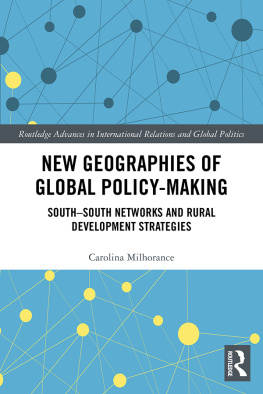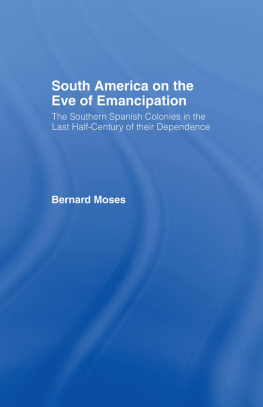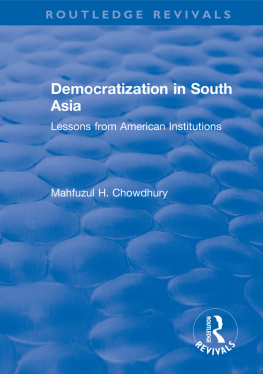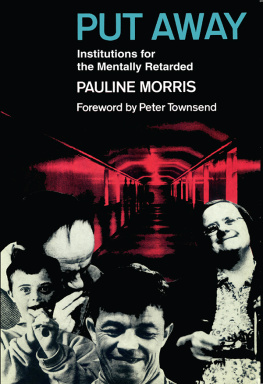1995 The University of North Carolina Press
All rights reserved
Manufactured in the United States of America
The paper in this book meets the guidelines for permanence and durability of the Committee on Production Guidelines for Book Longevity of the Council on Library Resources.
Library of Congress Cataloging-in-Publication Data
Noll, Steven.
Feeble-minded in our midst: institutions for the mentally retarded in the South, 19001940 / Steven Noll.
p. cm.
Includes bibliographical references and index.
ISBN 0-8078-2220-5 (cloth : alk. paper).
ISBN 0-8078-4531-0 (pbk. : alk. paper)
1. Mentally handicappedInstitutional careSouthern StatesHistory. 2. Mentally handicappedGovernment policySouthern States. 1. Title.
HV3006.S85N65 1995 | 94-49527 |
362.3850975dc20 | CIP |
99 98 97 96 95 5 4 3 2 1
Portions of Chapter 5 appeared in a somewhat different form in Southern Strategies for Handling the Black Feeble-Minded: From Social Control to Profound Indifference, Journal of Policy History 3 (Spring 1991): 13051.
Other portions of the manuscript have appeared in a different form as parts of the following articles: Care and Control of the Feeble-Minded: Florida Farm Colony, 19201945, Florida Historical Quarterly 69 (July 1990): 5780; A Far Greater Menace: Feeble-Minded Females in the South, 19001940, in Hidden Histories of Women in the New South, edited by Virginia Bernhard, Betty Brandon, Elizabeth Fox-Genovese, Theda Perdue, and Elizabeth Turner, 3151 (Columbia: University of Missouri Press, 1994); and Patient Records as Historical Stories: The Case of Caswell Training School, Bulletin of the History of Medicine 68 (Fall 1994): 41128.
THIS BOOK WAS DIGITALLY PRINTED.
TABLES
. Comparison of Descriptive Terminology, 1930 and 1994
. Institutions for the Feeble-Minded in the South
. Median IQ Scores of Southern Males, 1917 Army Alpha Test
. Commitment Procedures of Southern States
. Numbers of Mental Defectives Institutionalized, by Region, 1937
. Numbers of Mental Defectives Institutionalized in Southern States, 1937
. Patients in State Institutions for Mental Defectives, 1923, 1940 (average per 100, 000 persons)
. Average Length of Residence in Caswell Training School, by Sex, 19141939
. Monthly Pay of Superintendents, Teachers, and Attendants, Florida Farm Colony, 19211935
. Places of Employment for Patients at Caswell Training School, 1935
. Schools in Southern Institutions, 19381940
ACKNOWLEDGMENTS
In the six years this work has consumed my life, I have accumulated more debts than I care to imagine. I can never repay them; all I can do is acknowledge them with heartfelt thanks and hope I have not left anyone out. The financial help provided by the University of Florida Department of History was essential, for without it, this project could not even have been started, much less completed. I would also like to thank the Rockefeller Archive Center, Pocantico Hills, New York, and the North Caroliniana Society of Chapel Hill, North Carolina, for their travel to collection grants, which enabled me to conduct much of my research.
The supervising committee that oversaw this work in its initial form as a dissertation provided me with guidance, support, and help at every step of the process. Special thanks to Kermit Hall, my chairman, for his faith in my abilities and his knack for discovering the truly meaningful in my work. He always found time for my harried questions, even in the middle of an incredibly busy schedule. The other committee membersRobert Hatch, Michael Radelet, Bertram Wyatt-Brown, and Robert Ziegerall provided valuable intellectual advice and guidance. Michael Radelet also proved that good teaching, good research, and social activism are not mutually exclusive variables. My colleagues at the University of Florida (some of whom have moved on to other places in the interim)Jeff Adler, David Chalmers, Tom Gallant, Susan Kent, Anne Jones, Chris Morris, and Samuel Proctorgave me valuable help, some of it unsolicited, much of it unheeded, all of it appreciated.
Through the writing of this book I have discovered the meaning of the community of scholars. Many individuals with little stake in my work took the time to read the manuscript and offer encouragement and suggestions. Thanks to Cheryll Cody, Ellen Dwyer, Gerald Grob, John Hughes, Michael Sokal, Nicole Rafter, and Todd Savitt for their efforts.
Researching can be a difficult and lonely process. The help of archivists, librarians, and staff people made my life significantly easier. The librarians at the University of Florida, particularly Gary Cornwell in Government Documents, Lenny Rhine at the Health Center Library, and the staff of the P. K. Yonge Library of Florida History, saved me literally thousands of steps in running around campus. The staffs at the National Library of Medicine, University of Florida Health Center Library Annex in Jacksonville, the Rockefeller Archive Center, the Florida State Archives, the Georgia State Archives, the North Carolina State Archives, the South Carolina State Archives and Library, the Virginia State Archives and Library, the Jones Memorial Library in Lynchburg, Virginia, the South Caroliniana Collection and the medical library of the University of South Carolina, the Southern Historical Collection and the North Carolina Collection at the Wilson Library, University of North Carolina, Chapel Hill, the Alderman Library of the University of Virginia, the Social Welfare History Archives at the University of Minnesota, the General Federation of Womens Clubs Archives in Washington D.C., and the Florida Baptist Historical Collection at Stetson University all provided advice and comfort to a weary, and often grouchy, researcher. Special thanks to Mary Barnes and Gene Williams of the Old Records Center of the North Carolina State Archives, Conley Edwards of the Virginia State Archives, David Klaassen of the Social Welfare History Archives, and Earl Joiner of Stetson University for their personal attention. I would also like to thank Reed and Angie Bohne, Reggie Clark, Tom and Alison Duncan, Sue Lang, Don and Lane Neisen, Miriam Reiser, Al and Betsy Sharrett, and Bettye and Joe Harris for opening their homes and their refrigerators and providing a touch of home while I was on the road.
For this work, much research had to be conducted in nonresearch facilities, on the grounds of functioning institutions for mentally handicapped individuals. This could not have been possible without the help of staff who opened their archives and files to me. Special thanks to former superintendent Max Jackson and his secretary, Agnes Stanford, of the Tacachale Community (formerly Sunland Center) in Gainesville, Florida, for their encouragement of my work and their help in allowing me access to the vault files there. Similarly, the director of Caswell Center, Jim Woodall, and his assistants, Joanne Richiutti and Becky Brown, showed me the meaning of southern hospitality on my two trips to Kinston, North Carolina. Thanks also to Helen Hester, staff librarian at the Central Virginia Training Center, Lynchburg, Virginia, and the staff at Whitten Center, Clinton, South Carolina.













